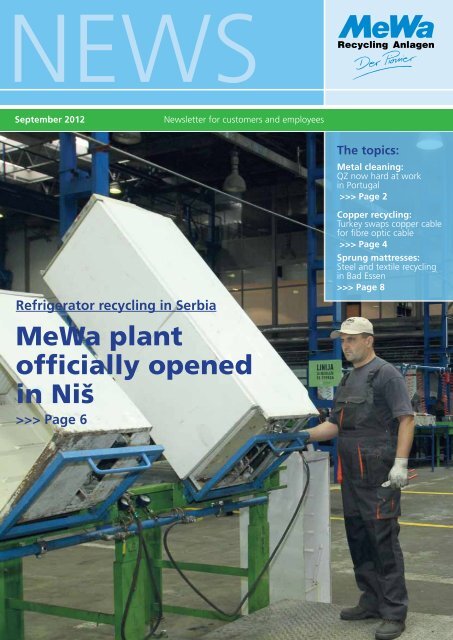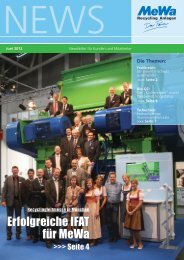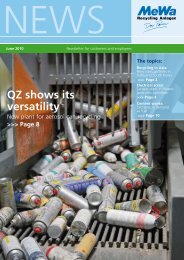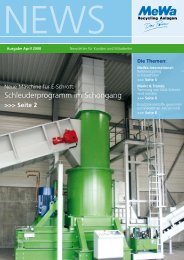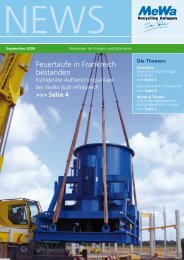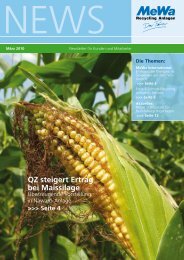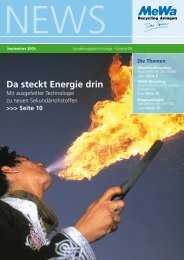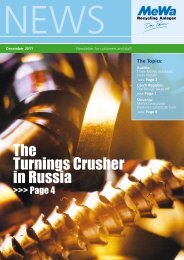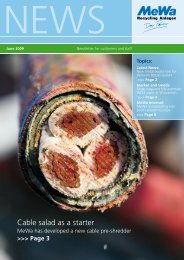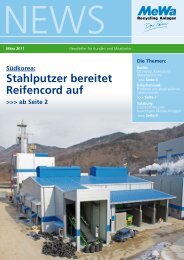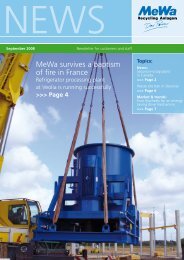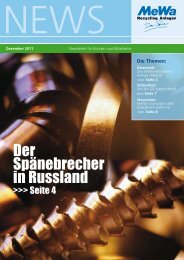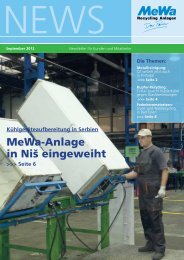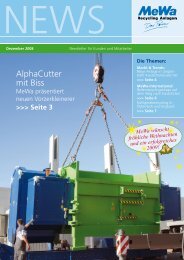Download - MeWa Recycling Maschinen und Anlagenbau GmbH
Download - MeWa Recycling Maschinen und Anlagenbau GmbH
Download - MeWa Recycling Maschinen und Anlagenbau GmbH
You also want an ePaper? Increase the reach of your titles
YUMPU automatically turns print PDFs into web optimized ePapers that Google loves.
NEWS<br />
September 2012<br />
Refrigerator recycling in Serbia<br />
Newsletter for customers and employees<br />
<strong>MeWa</strong> plant<br />
officially opened<br />
in Niš<br />
>>> Page 6<br />
The topics:<br />
Metal cleaning:<br />
QZ now hard at work<br />
in Portugal<br />
>>> Page 2<br />
Copper recycling:<br />
Turkey swaps copper cable<br />
for fibre optic cable<br />
>>> Page 4<br />
Sprung mattresses:<br />
Steel and textile recycling<br />
in Bad Essen<br />
>>> Page 8
2<br />
Metal recycling<br />
Stripped down twice:<br />
One QZ<br />
with two jobs<br />
It‘s its versatility that makes it so valuable. In Portugal,<br />
the <strong>MeWa</strong> Querstromzerspaner QZ now also strips<br />
From left to right: José Manuel Teixeira,<br />
Alain Schröder and Paulo Lourenco.<br />
down old electrical devices and<br />
at the same time cleans the<br />
ferrous metals that stem from<br />
other waste flows. The result is<br />
perfect utilisation of the plant.<br />
The Portuguese company Transucatas<br />
has its origins in metal recycling,<br />
with several sites across Portugal.<br />
With its expansion in recent years, plants<br />
for recycling tyres and various industrial waste<br />
products have also been added. Transucatas<br />
also uses turn-key <strong>MeWa</strong> plants with<br />
pre-granulation, granulation and separating<br />
technology to produce homogeneous<br />
substitute fuels in defined grain sizes from<br />
mixed industrial waste.<br />
In these plant types, a magnetic separator<br />
removes the ferrous metals from<br />
the material flow after pre-granulation.<br />
However, there are often still plastic films<br />
and textiles attached to the sharp-edged<br />
wires and metal profiles. This significantly<br />
impairs the intrinsic value of the metal<br />
fraction. Further processing of the metals<br />
is therefore recommended.<br />
Transucatas has now implemented<br />
a solution in Maia, near Porto, which is<br />
trend-setting in two ways: Recently, the<br />
company also started recycling electronic<br />
scrap and in doing so drafted a plant plan<br />
together with <strong>MeWa</strong> and the Portuguese<br />
<strong>MeWa</strong> sales partner Gruman, which can<br />
strip down electronic scrap and also separate<br />
metals from different origins.<br />
With the <strong>MeWa</strong> QZ 2000 HD Querstromzerspaner,<br />
it is possible to meet all<br />
the requirements of the European WEEE<br />
directive regarding environmentally friendly<br />
recycling of waste electrical and electronic<br />
equipment and, at the same time,<br />
guarantee highly economical utilisation<br />
of the plant.<br />
Chains instead of knives<br />
This is primarily due to the recycling<br />
principle of the patented <strong>MeWa</strong> machine.<br />
In contrast to shredding plants, which<br />
are operated in Portugal too by competitor<br />
companies, the QZ Querstromzerspaner<br />
does not rely on cutting tools. Instead,<br />
chains, which are fitted to the floor<br />
of a tank, accelerate the material at high<br />
speeds. The reciprocal physical stress and<br />
the impact against the drum wall cause<br />
the material to break down. And it does<br />
this in a gentle manner. Large parts break<br />
up, but small parts exit the outlet opening<br />
of the machine intact.<br />
Looks like plastic waste... ...but is 70% ferrous metal.<br />
Metal recycling<br />
This principle is particularly beneficial<br />
for electrical equipment. Environmentally<br />
harmful parts, such as batteries and capacitors,<br />
remain <strong>und</strong>amaged. At the same<br />
time, plastic housings, transformers, aluminium<br />
components, computer PCBs and<br />
other components are separated. The metals<br />
incorporated in shafts and electric motors,<br />
for example, present no obstacle to<br />
the Querstromzerspaner. The wear costs<br />
are minimal compared to those of shredder<br />
plants, and contamination due to destroyed<br />
capacitors and batteries is not a<br />
problem.<br />
The plant in Maia takes full advantage<br />
of these benefits. In addition to electrical<br />
scrap, metal separator fractions can be dispatched<br />
in the QZ. Plastics and textiles separate<br />
from the metals and lie freely on the<br />
evacuation conveyor ready for subsequent<br />
sorting. After the Querstromzerspaner, the<br />
material runs through various classification<br />
and separating technologies as well as Fe/<br />
NFe separation. A downstream sorting cabin<br />
is used for quality assurance. At the<br />
end, the fractions are ready for sale in maximum<br />
purities. Depending on the material<br />
composition, throughputs of four to six<br />
tons per hour can be achieved.<br />
Satisfied partners<br />
The Transucatas partners, José Manuel<br />
Teixeira and Carlos Teixeira, are impressed<br />
with the investment: „With the versatility<br />
of the <strong>MeWa</strong> QZ, we will later be able<br />
to run the plant in three-shift operation.<br />
After the successful test phase, we can<br />
promise ourselves the best output results<br />
and high profitability.“ ■<br />
3
Copper recycling<br />
Turkey, with its booming economy, is also in the fast lane on the data<br />
highway. The country on the Bosphorus is modernising its data<br />
networks and now backing fibre optic broadband. Waste disposal<br />
companies, such as ER Metal in Gebze near Istanbul, are handling<br />
the excavated copper cables, for this reddish metal still remains<br />
highly sought-after.<br />
In 2011, Turkey had the strongest economic<br />
growth worldwide. Almost all<br />
global companies have now taken root<br />
in the prospering economic metropolis of<br />
Istanbul. The city on the Bosphorus is already<br />
the symbol of an international hub.<br />
Even in the ancient world, it was not only<br />
commodities and merchants who operated<br />
on the Silk Road, but also ideas, world<br />
views and entire people between the Mediterranean<br />
and Asia.<br />
4<br />
Telecommunications networks<br />
Today, caravans from east to west are<br />
rare. To be able to master modern trade,<br />
finance and data transfers, it is rather<br />
high speed internet connections that are<br />
most in demand. Consequently, Turkey is<br />
one of the nations within the G20 states<br />
to modernise its telecommunications networks<br />
most quickly.<br />
Istanbul bridges the gap between east and west both figuratively<br />
and literally: Bosphorus Bridge in Istanbul at night.<br />
Fibre optic brings<br />
copper to light<br />
The medium of the future is the optical<br />
fibre. Not only does this allow for faster<br />
data connections and higher transfer rates,<br />
but the optical fibre is also significantly<br />
cheaper than the previously used copper<br />
cables. For every kilometre of new fibre<br />
optic networks, almost the same volume<br />
of copper cable is dug out of the earth.<br />
One man‘s joy is another man‘s sorrow?<br />
Is this the end of the age of copper<br />
cable and the beginning of the fibre<br />
<strong>MeWa</strong>-News September 2012<br />
UC 150 and UG 1600 MSL at the cable recycling plant in Sekerpinar, Turkey.<br />
optic era? Only for data networks. Everyday<br />
life without copper is unthinkable. This<br />
is a situation in which everyone stands to<br />
win. For example, unlike fibre optic cable,<br />
copper can conduct electricity. It has the<br />
second highest conductivity of all metals,<br />
ranking after silver but before gold.<br />
PCBs and integrated circuitry, transformer<br />
coils and electric cabling – almost all<br />
industrial machines rely on copper. Every<br />
mid-sized car today contains over 20 kg<br />
of copper. With the development of electric<br />
and hybrid cars, this share will increase<br />
significantly. In a booming industrial<br />
nation like Turkey, the copper from the excavated<br />
data cables is therefore urgently<br />
required elsewhere.<br />
ER Metal recycles cables<br />
Copper can often be recovered without<br />
any loss of quality. Specialist waste<br />
disposal businesses, like the Turkish metal<br />
recycling firm ER Metal based in Gebze<br />
on the Sea of Marmara, deal with the<br />
proper disassembly of the cable. In an industrial<br />
area in Sekerpinar, not far from the<br />
company‘s headquarters, a new site with<br />
storage space and a weigh bridge was recently<br />
acquired. In a hall of 3,000 m², the<br />
supplied cable waste is sorted and me-<br />
<strong>MeWa</strong>-News September 2012<br />
chanically recycled. To this end, Erdogan<br />
Akbay, Director of the Turkish metal recycling<br />
firm, has invested in technology from<br />
<strong>MeWa</strong>. „The machines are extremely robust,<br />
and allow for long-term work,“ said<br />
the businessman, explaining his decision.<br />
A UC 150 Rotary Shear and a UG 1600<br />
MSL Granulator crush the cable to small<br />
grain sizes. A magnet separates the ferrous<br />
metals from the material flow and<br />
Copper recycling<br />
a subsequent sorting line separates the<br />
different fractions from each other. The<br />
plastics from the sheathing are thermally<br />
recycled, and the copper, in maximum purity,<br />
is then available for transport to the<br />
copper works.<br />
Thus, on the journey from the Silk Road<br />
to the fibre optic street, copper is brought<br />
to light – for an up-and-coming economic nation<br />
has a high demand for raw materials. ■<br />
From left to right: Gabor Vidak (<strong>MeWa</strong>), Dennis Schmidt (<strong>MeWa</strong>), Erdogan Akbay (ER Metal),<br />
Ahmet Baran (<strong>MeWa</strong>), Volkan Akbay (ER Metal).<br />
5
6<br />
Refrigerator recycling<br />
From left to right: Siniša Mitrovic (President of the Serbian Chamber of Commerce), Helmut Oberguggenberger (<strong>MeWa</strong>),<br />
Ninoslav Milenkovic, Vladimir Zivaljevic, Vujadin Scekic (all three from Jugo-Impex management), Zoran Perisic (Mayor of Niš).<br />
Serbia joins in refrigerator recycling<br />
<strong>MeWa</strong> plant opened in Niš<br />
The first waste-disposal plant for refrigerators and electronic scrap in Serbia<br />
was recently officially opened in front of over 400 guests and significant media<br />
interest. Some 800 refrigerators or 80 tons of electronic scrap will in future be<br />
recycled each day at the site in Niš.<br />
Not even 12 months ago, representatives<br />
of <strong>MeWa</strong> and the Jugo-<br />
Impex shareholder Vujadin Ščekić<br />
met for initial talks in Niš. After this, not<br />
only was the former production hall of the<br />
Serbian washing machine manufacturer<br />
EIDA completely redeveloped, but modern<br />
offices and function rooms were also created.<br />
By the time of the opening ceremony<br />
at the end of September, the first refrigerator<br />
recycling plant in Serbia had been<br />
running in test operation for two months.<br />
With a throughput of 20,000 refrigerators,<br />
all parameters were optimised and the<br />
future staff extensively trained.<br />
Major media interest<br />
Everything else was also perfectly<br />
arranged for the opening ceremony: Over<br />
400 guests from the worlds of politics, economy<br />
and environmental associations as<br />
well as several television cameras and radio<br />
microphones had gathered in front of the<br />
stage, the start button was ready, the new<br />
plant presented itself in the spotlight and<br />
the experts waited for the start signal at<br />
their future workstations.<br />
And with the symbolic handover of the<br />
keys to the new operator, E-Reciklaza, the<br />
time had come: The representatives of all<br />
parties involved in the completion of the<br />
new plant pressed the red button together,<br />
to start the trend-setting recycling project.<br />
The Jugo-Impex Group, to which<br />
E-Reziklaza belongs, has its origins in the<br />
sale and distribution of refrigerators, but<br />
for ten years now has been operating recycling<br />
plants for copper and cable, and<br />
also dismantling used electrical equipment<br />
manually for some years. Now the Serbian<br />
company has succeeded in joining the<br />
world of mechanical recycling.<br />
„In Serbia, a law was passed regulating<br />
the disposal of refrigerators and<br />
electronic devices in accordance with<br />
the WEEE directive of the European Union,“<br />
explained Jugo-Impex CEO, Ninoslav<br />
Milenković. „To be able to implement this,<br />
we have searched for the best possible<br />
technology and have fo<strong>und</strong> a strong partner<br />
in <strong>MeWa</strong>.“<br />
Electronic scrap and refrigerators<br />
For <strong>MeWa</strong>, the new recycling line also<br />
represents a further milestone in plant<br />
construction. The new building in Niš is designed<br />
to selectively process refrigerators<br />
or electronic scrap. The process thus follows<br />
the <strong>MeWa</strong> recycling process, which<br />
has been awarded several environment<br />
prizes.<br />
For decades, refrigerators were manufactured<br />
with the use of chlorofluo-<br />
<strong>MeWa</strong>-News September 2012<br />
Combi-recycling plant for refrigerators and electronic scrap in Niš, Serbia.<br />
rocarbons (CFCs). Significant quantities<br />
were processed both in the refrigeration<br />
circuit and in the insulation. If refrigerators<br />
are not handled properly, these CFCs<br />
are released into the atmosphere and rise<br />
from there into the stratosphere. Decomposed<br />
by the energy-rich radiation of the<br />
sun, the released chlorine reacts with the<br />
ozone and destroys it.<br />
One effect of this reaction is the<br />
„ozone hole“. The harmful effects of<br />
the release of CFCs has been recognised<br />
worldwide and has resulted in new refrigerators<br />
being built without the use of CFCs.<br />
In new appliances, the CFCs have largely<br />
been replaced with combustible coolants<br />
or with pentane as the propellant in the<br />
insulating foam. All types are now fo<strong>und</strong><br />
in recycling.<br />
The dismantling process<br />
The <strong>MeWa</strong> plant technology is designed<br />
for simultaneous processing of CFC<br />
and pentane-foamed refrigerators. In<br />
a first step, the glass shelves are removed<br />
from the refrigerators, the cable and<br />
compressors removed and the refrigerant<br />
extracted. The carcass is then entered into<br />
the automatic recycling process via a gastight<br />
sluice. This prevents the escape of the<br />
greenhouse gases from the process. In a<br />
single-step process, the patented <strong>MeWa</strong><br />
QZ 2000 HD Querstromzerspaner first<br />
breaks the refrigerator down into its individual<br />
parts. These consist of iron, aluminium/copper,<br />
plastic and the polyurethane<br />
powder (PUR foam) of the insulation.<br />
The crushed PUR foam is then filtered<br />
and separated from the CFCs and other<br />
solvents in a matrix degasification process.<br />
These are routed into a cryogenic air-recycling<br />
plant using nitrogen. There, the CFCs<br />
and pentane gases are liquefied and provided<br />
in pressurised containers for transport<br />
to a chemical recycling facility.<br />
The iron, aluminium/copper and plastic<br />
parts are separated with mechanical<br />
separating technology. In the end, the materials<br />
– now free from CFC adhesions –<br />
are available for resale in highest quality,<br />
for example as class 1 refrigeration scrap.<br />
Some 800 refrigerators can be processed<br />
in this way each day. This covers<br />
the demand for all of Serbia. If the plant in<br />
Niš cannot be fully utilised in some phases,<br />
it is also possible to recycle electronic scrap<br />
there too. Instead of refrigerators, approximately<br />
four to five tons of household appliances,<br />
entertainment electronics, computers<br />
or washing machines per hour can<br />
be broken down into their individual parts<br />
in the <strong>MeWa</strong> Querstromzerspaner and separated<br />
into fractions by the existing separating<br />
technology.<br />
Refrigerator recycling<br />
Logistics available<br />
The required logistics have been set<br />
up by Jugo-Impex with an in-house collection<br />
system in Serbia and corresponding<br />
customer contracts for the output materials.<br />
Thus, the Balkan republic has succeeded<br />
in entering into an economically<br />
profitable refrigerator recycling business<br />
working according to the latest environmental<br />
standards.<br />
Reason enough to celebrate Serbian-style.<br />
After the commissioning, there<br />
were many hours of dancing, singing<br />
and laughing with live music and culinary<br />
delights. ■<br />
Constantine I, Niš<br />
Niš is the birth city of the Roman emperor<br />
Constantine I.<br />
Constantine the Great, as he was also<br />
called, achieved religious freedom in<br />
the Roman Empire through the Edict of<br />
Milan in 313. This also represented the<br />
beginning of the rise of the still young<br />
religion of Christianity to the most important<br />
religion in the Roman Empire.<br />
The thousand-year anniversary of this<br />
edict will be celebrated by Niš in the coming<br />
year with many events.<br />
Towards the end of his life, Constantine<br />
resided in the city of Constantinople,<br />
which was named after him<br />
(today Istanbul).<br />
7
Cosy rolls with cores<br />
as hard as steel<br />
<strong>MeWa</strong>‘s pioneering solution for production<br />
waste of sprung mattresses<br />
In the production of sprung mattresses,<br />
huge amounts of waste from edge cutoffs<br />
occur as production waste. Nobody<br />
has really dared to handle this unwieldy<br />
and heavy material to date. But now<br />
Kastrup <strong>Recycling</strong> in Bad Essen has taken up<br />
the challenge. Together with <strong>MeWa</strong>, a truly pioneering solution<br />
has been developed.<br />
On the 40,000 m² large company<br />
premises in the industrial area of<br />
Bad Essen Wehrendorf, Kastrup<br />
<strong>Recycling</strong> collects and sorts various secondary<br />
raw materials. The modern site and<br />
the location with good transport connections<br />
with direct links to motorways, the<br />
8<br />
Textile recycling<br />
Mittelland Canal and the rail network allows<br />
the company to further differentiate<br />
its range of services and expand its services<br />
with the new <strong>MeWa</strong> plant.<br />
One of these new services is piling up<br />
on the company premises in the form of<br />
huge rolls of sprung mattresses. The textile/wire<br />
b<strong>und</strong>les looks like foam cushions<br />
at first glance. But the rolls of up to<br />
1.70 metres are literally full of substance.<br />
The waste from the production of sprung<br />
mattresses consists of 93% iron. The cosy<br />
steel mesh weighs up to 250 kg.<br />
Mittelland Canal at Bad Essen Wehrendorf.<br />
Spring core challenge<br />
Their weight and size means these<br />
soft b<strong>und</strong>les of steel present a real<br />
challenge. After all, the high share of iron<br />
alone is a knock-out criterion for most<br />
shredders. Not only that, but this particular<br />
iron is spring steel with a hardness of<br />
54 HRC, thus forming a constant, almost<br />
insurmountable resistance to shredding.<br />
„This is a material flow that nobody actually<br />
wants,“ admits <strong>MeWa</strong> Sales Manager<br />
Jürgen Müller-Webers.<br />
Not so at Kastrup <strong>Recycling</strong> in North-<br />
Rhine Westfalia. The company, which is<br />
based in Bielefeld, has been collecting<br />
waste materials for over 100 years, recycling<br />
them and then recirculating them.<br />
Director Volker Kretzschmar was thus impulsively<br />
interested in the high levels of<br />
recyclable material in textile waste. The<br />
search for the right technology to recycle<br />
the bulky load led the waste disposal<br />
manager to Gechingen.<br />
Pre-granulation in the UC 150<br />
And when it‘s a case of mastering pi-<br />
oneering tasks, the designers at <strong>MeWa</strong><br />
continuously provide extremely innovative<br />
solutions. The positive trials in the Gechingen<br />
test stand were followed immediately<br />
by the detailed plans. Recently, a<br />
<strong>MeWa</strong> UC 150 Rotary Shear with intensified<br />
drive output started providing the necessary<br />
power in Bad Essen. The rolls are<br />
fed into the hopper completely and, with<br />
the help of the compactor, shredded into<br />
strips in a single operation.<br />
Via an intermediate bunker, the<br />
shredded wires and fabric scraps are<br />
fed into a <strong>MeWa</strong> UG 1007 Granulator.<br />
The post-granulator, with<br />
reinforced rotor, crushes the<br />
material to a grain size of less<br />
than 30 millimetres.<br />
A subsequent separating<br />
station then provides separate<br />
fractions. The fluff and material<br />
is blown out with an air separating<br />
unit, and a magnet lifts off<br />
the spring steel. This is supplied to the<br />
steel-producing industry. The textiles, on<br />
Textile recycling<br />
Pre-granulation in the UC 150... ...and post-granulation in the UG 1007.<br />
the other hand, are marketed as substitute<br />
fuel.<br />
Director Volker Kretzschmar is extremely<br />
happy with the solution, as the<br />
<strong>MeWa</strong> machine technology and the existing<br />
infrastructure in Bad Essen have allowed<br />
the recycling company Kastrup to<br />
lay the fo<strong>und</strong>ations for further handling<br />
of scrap. ■<br />
9
10<br />
Bio-QZ<br />
Packaged food<br />
is washed<br />
In 2010, the Danpower<br />
Group from Potsdam<br />
took over the biogas<br />
plant in Bad Köstritz.<br />
And they modernised it<br />
from top to bottom.<br />
With a new recycling<br />
and feeding line, the<br />
plant can now be<br />
operated economically<br />
again.<br />
The Danpower <strong>GmbH</strong>, based in<br />
Potsdam, is an investor of bioenergy<br />
projects with high experience.<br />
The company operates 27 biogas plants<br />
throughout Germany.<br />
The new owner of the biogas plant<br />
Bad Köstritz set up first a sustainable concept<br />
for efficient operation of the plant.<br />
For planning and implementation of the<br />
High packaging share in the organic waste.<br />
The Bio-QZ 1200 used for recycling organic waste.<br />
task, Danpower obtained the help of two<br />
strong partners in Silberland <strong>GmbH</strong> and<br />
<strong>MeWa</strong>.<br />
Investments were made in the infeeding<br />
line, for example, so that the range<br />
of materials used could be expanded significantly.<br />
The input materials are mainly<br />
organic waste from households and restaurants<br />
as well as packaged food from<br />
supermarkets from the entire area of Gera.<br />
The high packaging and foreign material<br />
share in the substrates, however, makes<br />
extensive processing necessary. To help<br />
with this, the experienced <strong>MeWa</strong> employee<br />
Harry Geppert planned a trend-setting<br />
plant solution. The supplied organic waste<br />
is first fed into the <strong>MeWa</strong> Bio-QZ 1200 via<br />
a feed hopper. Extensive tests were performed<br />
on the waste, so that the machine<br />
settings are now optimized for the different<br />
input materials. Up to 15.000 tons<br />
of biowaste per year can be processed by<br />
the plant.<br />
The <strong>MeWa</strong> Bio-QZ as the core machine<br />
of the infeeding process homogenizes<br />
and then routes it into a washing<br />
screw. The mineral content breaks off and<br />
is discharged. The remaining oversize material<br />
is routed through a magnetic separator,<br />
where it is separated into a sale-<br />
able iron fraction which consists mainly<br />
of tin cans, and an equally recyclable plastic<br />
fraction. The substrate is routed into<br />
the fermenter.<br />
From left to right: Christian Podritzke<br />
(Danpower), Frank Griebenow (Danpower),<br />
Harry Geppert (<strong>MeWa</strong> Site Freiberg).<br />
The investment pays of: In the meantime,<br />
the biogas plant Bad Köstritz has<br />
reached its electrical output capacity of<br />
four megawatts. ■<br />
Black beer<br />
Bad Köstritz is home to one of the oldest<br />
breweries in Germany. It was first mentioned<br />
as early as 1543. Köstritzer black<br />
beer has made the small town in Thuringia<br />
famous beyond Germany‘s borders.<br />
Even Johann Wolfgang von Goethe<br />
praised the good taste of the beer.<br />
<strong>MeWa</strong>-News September 2012<br />
Umut Serdar Yalcin (Director of RDF Kontamine).<br />
Hobas-Trinkwassertanks.<br />
Capacity: Zerkleinerte 1,000 GFK-Rohre. tons of oil filters per year.<br />
<strong>MeWa</strong>-News September 2012<br />
The once small town of Kocaeli to the<br />
east of Istanbul has developed into<br />
a leading industrial region in recent<br />
years. Spatially, the town has long since<br />
grown together with the Bosphorus metropolis<br />
of Istanbul.<br />
The necessary supplies of<br />
raw materials are provided<br />
by the many<br />
recycling businesses<br />
which<br />
have in the<br />
meantime<br />
been set up<br />
i n this area. One<br />
of these young, modern<br />
companies is RDF Kontamine, which<br />
specialises in the production of substitute<br />
fuels and has established itself as a partner<br />
of the cement industry.<br />
To this end, company director Umut<br />
Serdar Yalcin commissioned a <strong>MeWa</strong> recycling<br />
line for packaging waste two years<br />
ago. Depending on demand,<br />
the plant has since<br />
been supplying homogeneous<br />
substitute fuels in<br />
grain sizes of 30 to 50 millimetres.<br />
This première has now<br />
been followed by another:<br />
Entirely in red, Turkey‘s first<br />
recycling plant for passenger<br />
car oil filters shines<br />
out. A <strong>MeWa</strong> UC 60 Rotary<br />
Shear and a <strong>MeWa</strong> UG<br />
600 Granulator crush the<br />
used oil filters into small<br />
Oil filter recycling<br />
Oil filters for the<br />
cement industry<br />
Red like the famous Turkish flag, a quite<br />
special recycling plant shines bright in the<br />
industrial region of Kocaeli to the east of<br />
Istanbul. The company RDF Kontamine, part<br />
of the Anatoli Pars Group, has commissioned<br />
the first mechanical recycling plant in Turkey<br />
for used oil filters.<br />
grain sizes at the Kocaeli site. In a centrifuge,<br />
the components are freed from the<br />
adhesive oil. These components are predominantly<br />
ferrous metal, textiles and paper.<br />
The oil is collected in a tank and is available<br />
as fuel. The remaining material is dry<br />
after the centrifuge and can therefore be<br />
separated into a ferrous and non-ferrous<br />
fraction with the help of a magnet.<br />
The textiles and paper are also in demand<br />
as fuel with a high calorific value.<br />
The metal, on the other hand, is sold off<br />
to steel smelting businesses. Aro<strong>und</strong> 1,000<br />
tons of oil filters can be recycled per year<br />
in the small but excellent recycling plant.<br />
And with the red paintwork, the plant<br />
is also a visual symbol of Turkey: At RDF<br />
Kontamine, the national colour represents<br />
resource-efficient conduct and a sustainable<br />
energy supply. ■<br />
From left to right: Fatih Aydemir (RDF<br />
Kontamine), Éva Takács (<strong>MeWa</strong> Györ) and<br />
Dilek Kiliç (RDF Kontamine).<br />
11
Imprint<br />
<strong>MeWa</strong>-News<br />
<strong>MeWa</strong> <strong>Recycling</strong> <strong>Maschinen</strong><br />
<strong>und</strong> <strong>Anlagenbau</strong> <strong>GmbH</strong><br />
Gültlinger Straße 3, 75391 Gechingen<br />
Editor: Harald Pandl<br />
Tel. 0049 (0)7056 925-0<br />
E-mail: info@mewa-recycling.com<br />
Internet: www.mewa-recycling.com<br />
Design: <strong>MeWa</strong> in collaboration with<br />
Creativ-Werbung M. Dostal, Tiefenbronn<br />
Printing: Druckhaus Weber, Althengstett<br />
Photo credits: <strong>MeWa</strong>, M. Dostal,<br />
Jugo-Impex, Wikipedia, Köstritzer<br />
Schwarzbierbrauerei <strong>GmbH</strong><br />
Cover photo: E-Reciklaza Refrigerator<br />
<strong>Recycling</strong><br />
12<br />
<strong>MeWa</strong> aro<strong>und</strong> the world<br />
...to the southernmost<br />
point of Steiermark,<br />
Austria...<br />
From Gechingen<br />
to the wide world...<br />
...and to<br />
Mongolia...<br />
...to Woudrichem,<br />
Holland...<br />
<strong>MeWa</strong>-News September 2012


